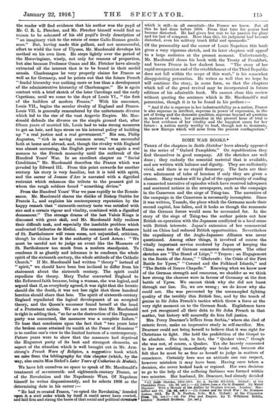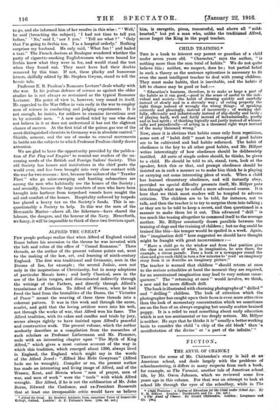SOME WAR BOOKS."
THREE of the chapters in Battle Sketches' have already appeared in the series of " Oxford Pamphlets." On republication they find themselves in good company. All the sketches are well done ; they embody the essential material that is available, and are written with balance and dignity. They are sufficiently vivid, and there is no stupid flummery. The facts are their own adornment of tales of heroism if only they are given a chance. Many readers will be glad of the opportunity of reading
a connected narrative of episodes which have received infrequent and scattered notices in the newspapers, such as the campaign in the Cameroon and the siege of Tsing-too. The narrative of the campaign in the Cameroon is necessarily incomplete. Since it was written, Yaunde, the place which the Germans made their second capital, has fallen, and it looks as though the remnants of the German forces would soon be accounted for. In the story of the siege of Tsing-tao the author points out how British co-operation with the Japanese conflicted in a local sense with British interests. Japan's extension of her commercial hold on China had reduced British opportunities. Nevertheless the expediency of the Anglo-Japanese Alliance was never questioned. Among other things, it involved of course the vitally important service rendered by Japan of keeping the China seas free of German commerce destroyers. The other sketches are " The Stand of Liege," " Troyon : an Engagement in the Battle of the Aisne," " Gheluvelt : the Crisis of the First Battle for Ypres," " Coronel and the Falkland Islands," and "The Battle of Neuve Chapelle." Knowing what we know now of the German strength and resources, we shudder as we think how strong the chances were in favour of Germany at the first battle of Ypres. We cannot think why she did not burst through our line. No, we are wrong ; we do know why she could not. She was prevented by the unexampled fighting quality of the terribly thin British line, and by the touch of genius in Sir John French's tactics which threw a force at the very right moment on to the German flank. Englishmen have not yet recognized all their debt to Sir John French in that matter, but history will assuredly do him full justice.
Mrs. Percy Dearmer's -letters from Serbia,' where she died of enteric fever, make an impressive study in self-sacrifice. Mrs. Dearmer could not bring herself to believe that it was right for Christians to fight. She held the prohibition of the Gospel to be absolute. She took, in fact, the " Quaker view," though she was not, of course, a Quaker. Yet she bravely consented to her son enlisting immediately war broke out, because she felt that he must be as free as herself to judge in matters of conscience. Certainly hers was an attitude one can respect, however mistaken it may have been. Having once taken a decision, she never looked back or repined. Her own decision to go to the help of the suffering Serbians was formed within two minutes. Her husband, Dr. Dearmer, had already decided • (1) Dark Sketches, 1914-1915. By A. Neville BS ditch. Oxford : at the Clarendon Press. 12s. 6d. net.)— (2) Letters from a Fie Id Hospital. By Mabel Deanne!. With a Memoir of the Author by Stephen Gwynn. London : Mac- millan and Co. [2s. 8d. net.)—(a) Science and the Great War : the Hamann Lecture, 1915. By E. B. Poniton, D.Se., M.A. Oxford : at the Clarendon Prem. [2s. net.]--(4) For Flag and Empire. By T. Wilkinson Riddle. London • Marshall Brothers. [is. net.] to go, and she informed him of her resolve in this wise : " ' Well,' he said [broaching the subject], ' I had not time to tell you before.' No,' said I, nor I you.' Tell me what ? " Only that I'm going to Serbia too. I'm a hospital orderly.' Nothing surprises my husband. He only said, What fun ! ' and hailed a taxi." The French doctors at Boulogne wondered whether the party of cigarette-smoking Englishwomen who were bound for Serbia kneir what they were in for, and would stand the test when they found out. They must have had their doubts removed by this time. If not, these plucky and humorous letters, skilfully edited by Mr. Stephen Gwynn, stand to tell the heroic tale.
Professor E. B. Poulton's Romanes Lectures deals wholly with the war. In his jealous defence of science as against the older studies ho is not always so restrained as the typical Romanes Lecturer. His point of view is, however, very sound in itself. He appealed to the War Office in vain early in the war to employ men of science in conducting and judging experiment% It is not enough, he insists, for soldiers to examine inventions sent in by scientific men. " A new method tried by one who does not believe in it or does not understand it has not the slightest chance of success. At the first trial of the poison gas one of the most distinguished chemists in Germany was in absolute control." Shields, armour, and the use of smoke to conceal movements in battle are the subjects to which Professor Poulton chiefly draws attention.
We are glad to have the opportunity provided by the publica- tion of For Flag and Empire' to remind our readers of the un- ceasing needs of the British and Foreign Sailors' Society. This old Society has homes and institutions in the chief ports the world over, and has been brought into very close contact with the war for two reasons : first, because the sailors of the " Trawler Fleet " who go mine-sweeping and hunting submarines are among the men who habitually use the homes of the Society ; and secondly, because the large numbers of men who have been brought into harbour from torpedoed vessels have sought the aid and comfort of the homes. Hospitality enforced by torpedo has placed a heavy tax on the Society's funds. This is un- questionably a Society to help. In this war the men of the Mercantile Marine—above all, the fishermen—have shared the labours, the dangers, and the honour of the Navy. Henceforth, we fancy, it will be impossible to think of these two Services apart.



































 Previous page
Previous page